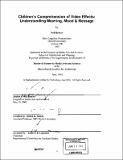Children's comprehension of video effects : understanding meaning, mood & message
Author(s)
Breyer, Nell (Nell Beryl), 1971-
DownloadFull printable version (5.997Mb)
Other Contributors
Massachusetts Institute of Technology. Dept. of Architecture. Program In Media Arts and Sciences.
Advisor
Brian K. Smith.
Terms of use
Metadata
Show full item recordAbstract
Children's comprehension of special effects was examined in a series of digital video workshops designed for 9-14 year olds. Children assessed illusions in film, TV and video. They made observations about a mood or message conveyed through these magical "tricks" and effects, and generated hypotheses about techniques underlying their production. Children then tested their preconceptions, building action-based stories with effects in the workshop. Children's explanations and videos were compared. Film elements conveying narrative meaning and mood are described. Mechanisms driving change in understanding are discussed. Initially, children described features or instances of effects, but not their context or purpose. Responses after the workshop reflected a shift in understanding. Kids did not describe how effects appear within a story (e.g. what they look like to us). Instead, they described how effects operate on the audience (e.g. what they evoke in us). The mean use of special effects between story conception and production increased significantly. Across and within group analysis of effect type, revealed interactions between emotional intent, camera-motion effects, and sound effects. The findings reveal preconceptions these young novices had about cinematic techniques. The workshop interventions aimed to introduce children to an increasingly sophisticated knowledge of cinematic techniques, and to a range of tools and formats for storytelling. The research has implications for children's learning, and activities that support critical comprehension of motion picture stories - such as those seen on TV, film, and video. The research is directed towards development of activities that support imagination, comprehension and expression in storytelling.
Description
Thesis (S.M.)--Massachusetts Institute of Technology, School of Architecture and Planning, Program in Media Arts and Sciences, 2002. Includes bibliographical references (p. 51-53).
Date issued
2002Department
Program in Media Arts and Sciences (Massachusetts Institute of Technology)Publisher
Massachusetts Institute of Technology
Keywords
Architecture. Program In Media Arts and Sciences.